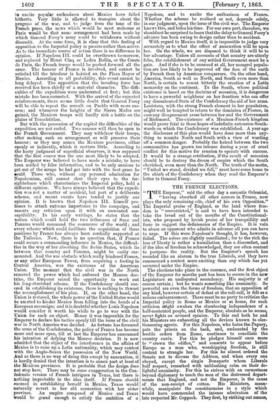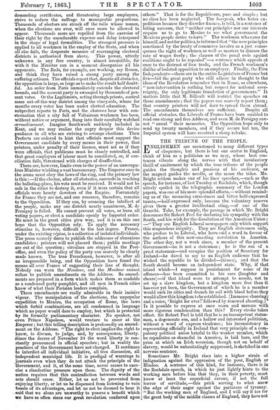THE FRENCH ELECTIONS.
The elections take place in the summer, and the first object of the Emperor for months past has been to secure in the new Legislature an undisputed ascendancy. His majority is of course certain ; but he wants something like unanimity. So powerful are even the forms of freedom, that an opposition of any kind, however certain of defeat at the roll-call, is felt as a, serious embarrassment. There must be no party to criticize the Imperial policy in Rome or Mexico or at home, for such criticism alight awaken the slumbering independence of a half-contented people, and the Emperor, absolute as he seems, never fights an aroused opinion. To this end both he and his Ministers are exhausting all the devices known to elec- tioneering agents. For this Napoleon, who hates the Papacy, pats the priests on the back, and, undaunted by the hostile orders from Rome, continues to conciliate the country cures. For this he pledges himself once more to " crown the edifice," and consents to appear before Europe as a man who, worshipping freedom, is still content to strangle her. For this he almost ordered the Senate not to discuss the Address, and when every one obeyed, except the single Bonaparte whom Liberals half respect, remarked with unblushing calm on their de- lightful unanimity. For this he strives with an earnestness beyond diplomacy to teach the men of the distressed depart- ments that England, and not the Emperor, is the cause of the non-receipt of cotton. His Ministers, mean- while, manipulate the constituencies in a style which would have commanded the intense admiration of the late respected Mr. Coppock. They first, by striking out names, demanding certificates, and threatening large employers, strive to reduce the suffrage to manageable proportions. Thousands of electors are struck off the rolls whose names, when the elections are over, will once more be allowed to appear. Thousands more are repelled from the exercise of their right by the unendurable expense and delay interposed in the shape of legal formalities. The strongest pressure is -applied to all workmen in the employ of the State, and when .all else fails, the desperate measure of rearranging electoral districts is authorized from above. This power, utterly 'unknown in any free country, is almost irresistible, for with it the Minister can in a moment disorganize all his opponents. The Reds, for example, are working, say Rouen, and think they have raised a strong party among the suffering artisans. The officials report that, despite all obstacles, the opposition is large, so large as to make the result half doubt- ful. An order from Paris immediately extends the electoral bounds, and the nascent party is swamped by thousands of pea- sant votes. Or the Legitimists, acting through priests, control some out-of-the-way district among the vineyards, where for months every voter has been under clerical education. The subprefect reports to Paris, and the chateaux hear with con- sternation that a city full of Voltairean workmen has been, without notice or argument, flung into their carefully watched .arrondissement. Imagine Southwark suddenly included in Kent, and we may realize the angry despair this device produces in all who are striving to arrange elections. Then Prefects are ordered to hint that officials must support the 'Government candidate by every means in their power, that printers, under penalty of their licence, must act as if they were officials, that publicans must, be closely controlled, and that great employers of labour must be conciliated, or, if con- -ciliation fails, threatened with charges of disaffection.
There are, however, limits even to the power of an unscrupu- lous Minister wielding a vast bureaucracy. The Emperor once in the arena must obey the laws of the ring, and the primary law is this :—If the elector, after all obstacles, succeeds in reaching the balloting-place, his vote must be received. It would not be -safe in the cities to destroy it, even if it were certain that all officials were hearty devotees of the Empire. Fortunately for France they are not, and one resource, therefore, remains to the Opposition. If they can, by arousing the intellect of the people, make any one district nearly unanimous, M. de Persigny is foiled. He cannot prevent all votes, or burn all voting papers, or elect a candidate openly by Imperial order. He must in the great cities give way, and it is on this one hope that the Opposition rely. To apply the necessary stimulus is, however, difficult to the last degree. France, under the existing regime, is a collection of isolated individuals. 'The press scarcely dares to publish the addresses of obnoxious -candidates; printers will not placard them; public meetings are out of the question ; circulars are stopped in the Post- -office, and even the policy of the party can scarcely be clearly made known. The true Frenchman, however, is after all an irrepressible being, and the Opposition have found the means all over France of suggesting their line of thought. Nobody can warn the Moniteur, and the Moniteur cannot refuse to publish amendments on the Address. So amend- ments are prepared in a form which makes them as readable as a condensed party pamphlet, and all men in French cities know of what their Parisian leaders complain.
These amendments are really admirable in their incisive vigour. The manipulation of the elections, the unpopular -expedition to Mexico, the occupation of Rome, the laws which forbid combinations, are all condemned in language which no paper would dare to employ, but which is protected by its formally parliamentary character. No speaker, not even Prince Napoleon, would venture to sneer at the Emperor ; but this telling description is professedly an amend- ment on the Address. " The right to elect implies the right to know, to discuss, to judge, and, by consequence, liberty. since the decree of November 24 the word liberty is con- stantly pronounced in official speeches ; but in reality the practices of the Government have not changed. It continues to interdict all individual initiative, all free discussion, all independent municipal life. It is prodigal of warnings to journals even when they do not attack the principle of the Government, and it, at the same time, never ceases to exer- cise a clandestine pressure upon them. The dignity of the nation requires that this contradiction between words and acts should cease. Either, let us not be prevented from -enjoying liberty, or let us be dispensed from listening to vain boasts of its advantages, and let us not be doomed to hear it said that we alone are unworthy to possess a benefit which Ire have so often since our great revolution conferred upon others." That is for the Republicans, pure and simple ; but no class has been neglected. The bourgeois, who hates ex- peditions because they disorder finance, is told, in a sentence of biting sarcasm, that "neither our principles nor our interests require us to go to Mexico to see what government the Mexican people desire to have." The workman who cares for himself, and not for politics, is informed that "the new principles sanctioned by the treaty of commerce involve as a just conse- quence the right of workmen as well as masters to discuss the rate of wages freely ; the clauses of the penal code against coalitions ought to be repealed"—a sentence which appeals at once to the distrust of free trade, and the French workman's dislike of isolated opposition to an employer. Finally, the Five Independents—there are in the entire Legislature of France but five—bid the great party who still adhere in thought to the ideas of the Revolution remember that in Rome, as elsewhere, " non-intervention is nothing but respect for national sove- reignty, the only legitimate foundation of governments." It matters little that M. Billault will restrict the speeches on those amendments ; that the papers can scarcely report them; that country printers will not dare to spread them abroad.
The amendments themselves are sufficient. Despite all official obstacles, the Liberals of France have been enabled to read one strong and free Address, and even M. de Persigny can- not " annul " their memories. The Opposition hope only to send up twenty members, and if they secure but ten, the Imperial system will have received a sharp rebuke.































 Previous page
Previous page